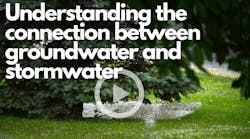Researchers from the University of Maryland finds that people have three main differing preferences for improving stormwater infrastructure, according to a piece by the University of Maryland’s Kimbra Cutlip.
Throughout the mid-Atlantic, communities are facing more powerful floods that overwhelm stormwater infrastructure. The new research finds that, while many agree that the old, centralized approach to stormwater management needs to change, people’s differing approaches to improving stormwater infrastructure falls into three divergent camps.
Two groups felt that stormwater posed a public threat but disagreed about who was responsible for mitigation programs on private lands. The third group saw stormwater as an underutilized resource that should be managed with technology.
The study was published on Oct. 26 in the Journal of Environmental Planning and Management.
“Our research shows us where the disconnect is between different stakeholders and their attitudes toward stormwater management,” says Matthew Wilfong, lead author of the study. “That information allows policymakers to better identify areas where they need to adjust their policies or change the way they implement their programs and talk about stormwater management.
In the U.S., stormwater has typically been managed through a network of pipes, storage facilities, and treatment plants. These systems represent a centralized, top-down approach in which infrastructure exists on public lands and policies and practices are shaped by scientists, engineers, and government decision makers.
But these centralized systems are becoming increasingly ineffective under changing climate conditions and increasing development, which expands impervious surfaces and increases runoff. For developed area in the mid-Atlantic, preventing future floods and contamination from wastewater overflows will involve a more decentralized approach that reduces stormwater flowing into drainage systems.
For example, retention ponds, rain gardens, and rain barrels absorb and capture rain water from parking lots, lawns, and roofs. Such decentralized practices require the involvement of private landowners, however, and raise questions about who is responsible for stormwater management.
Wilfong and his colleagues used survey data from two watersheds in Maryland to better understand stakeholder opinions about the potential threats posed by stormwater, how it should be managed, and who should bear responsibility. They used sophisticated survey and analysis methods that allowed them to include open-ended questions so respondents could describe their thoughts and attitudes rather than simply selecting pre-written answers.
“This paper took a deep dive into the diversity of thought of these stakeholders,” says Mitchell Pavao-Zuckerman, co-author of the paper. “We found that stakeholders really are varied in how they see the responsibility of the individual to manage stormwater and even whether they see stormwater as a threat or a resource.”
The researchers came up with three names to categorize the distinct sets of attitudes toward stormwater.
- Market decentralists believe private landowners should be responsible for managing stormwater on their property and support financial incentive programs that pay them for practices like rain barrels, rain gardens, and stormwater fees and taxes that help municipalities pay for such programs.
- Anti-market decentralists strongly oppose current fees and incentive programs on the grounds that they are inequitable and unfair, especially for low-income communities. This group believes the design and implementation of stormwater programs must include more community participation and input and that the benefits of such practices should be better articulated to homeowners and communities.
- The third group, technocratic opportunists, saw stormwater as an under-explored potential resource. They believed decentralizing stormwater management should focus on technological innovations and scientific research to exploit stormwater for things like irrigation or generating electricity.
Although their sample size was too small to characterize the different groups, more homeowners fell into anti-market decentralist camp than the other two, which both had a mix of stormwater professionals, researchers, government representatives, and homeowners.
Pavao-Zuckerman and Wilfong said that the next step for this work would be to try to determine the common characteristics of individuals who fall into each camp, and the factors that would make incentive programs more equitable and desirable.






